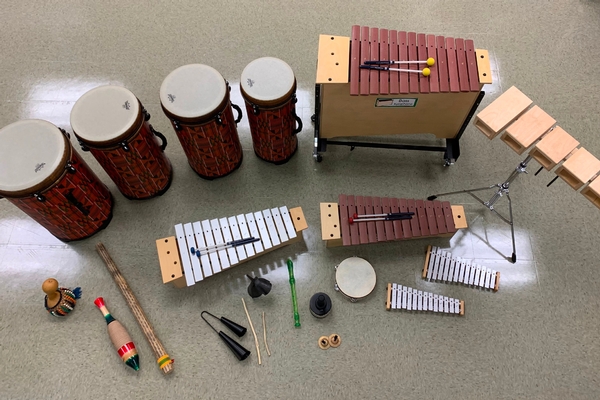Music
Here at St. Leo’s Catholic School, we subscribe to the Orff-Schulwerk philosophy of music education. What is the Orff philosophy? Stated simply, it is a creative process started by Carl Orff that uses singing, playing, moving, listening, and creating to help the child develop fully their innate desire to enjoy music. Konnie Saliba, one of the Orff pioneers here in the US, states that,
“In Orff-Schulwerk, all facets of expressing, creating, and performing music are integrated from the first moment class begins. The child is the participant involved in and making his own music. In an Orff class, the child is never a spectator. He is working and playing simultaneously, because for a child work and play are the same.”
Pitched and unpitched instruments, which include World Drumming, i.e tubanos, shekeres, gankogui, cowbell, etc. are used to create an exciting and inviting environment for our students to fully explore what music has to offer. World Drumming helps with cooperation, cultural awareness, respect, focus, a sense of beat and rhythm, ensemble, and listening to name a few.
Elementary Music
St. Leo's elementary music program follows the Orff Schulwerk approach, emphasizing active music-making through singing, movement, and instrument play. Students engage with a variety of musical activities to develop their musical skills and appreciation.
Kindergarten:
- Experience steady beat through movement and song.
- Imitate simple two-pitch melodies using iconic symbols.
- Recognize dynamics and tempo in music.
- Compose and read simple rhythm patterns using iconic symbols for quarter notes and quarter rests.
First & Second Grade:
- Develop proper singing and playing techniques with pitched and unpitched instruments.
- Continue steady beat proficiency and imitation of three-note patterns.
- Identify and use half notes, quarter notes, half and quarter rests, and beamed eighth notes.
Third & Fourth Grade:
- Apply changes in dynamics, tempo, timbre, and texture when singing and playing.
- Use expressive qualities in performing music from different genres and cultures.
- Interpret and notate rhythm patterns in 2/4, 3/4, and 4/4 time signatures.
- Recognize standard symbols and terms for dynamics, tempo, and articulation.
- Begin part singing through vocal ostinatos, partner songs, and rounds.
Fifth Grade:
- Recognize and interpret patterns in 2/4, 3/4, 4/4, and 6/8 time signatures using various note values.
- Recognize bass and treble clef notes.
- The curriculum draws from Music Express, Gameplan, First Steps by John Feierabend, and Music Play.
Middle School Music & Drama
In middle school, students explore a broader range of musical and dramatic arts, building upon their foundational skills.
Sixth Grade:
- Study hymnology, composers, and genres of music.
- Explore world music and play various instruments.
- Incorporate movement into musical activities.
Seventh & Eighth Grade:
- Delve into the world of theatre, including acting, stagecraft, and performance techniques.
- Collaborate on a spring musical production, showcasing their skills in a live performance.
- The program emphasizes creativity, teamwork, and appreciation for the performing arts.

